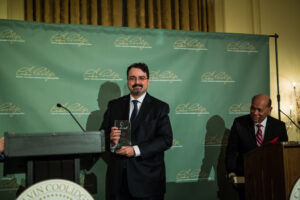
This op-ed was written by Steven Frias of Cranston, Rhode Island, the 2015 winner of the Coolidge Prize for Journalism. Mr. Frias, a twice-monthly contributor, is a regulatory lawyer, Rhode Island’s Republican National Committeeman and the author of “Cranston and Its Mayors: A History.”
A tax we’ll all pay someday
Providence Journal
April 15. 2015
http://www.providencejournal.com/article/20150415/OPINION/150419591
Gov. Gina Raimondo’s budget includes a proposal to create a new state property tax to be assessed on non-owner-occupied residential properties valued at a $1 million or more. Because it affects expensive vacation homes, like the one owned by pop singer Taylor Swift, it is being justified as a luxury tax or as a tax on the wealthy who can afford it. However, history has shown that taxes on luxuries can harm people other than the wealthy and taxes on the wealthy can turn into taxes on the general public.
One luxury tax that ended up harming more than the wealthy was the federal tax on expensive boats. In 1990, President George H.W. Bush and Congress crafted legislation that included various tax increases, breaking Bush’s campaign pledge against new taxes. One such tax was a new federal excise tax of 10 percent on boats sold for more than $100,000.
Boat sales plummeted and the boat industry sank into an economic crisis. There were estimates that more than 10,000 workers in the boat industry were unemployed, of which more than 1,000 were from Rhode Island. Boat builders burned a boat in Narragansett Bay in protest. Instead of soaking the rich, the new tax put blue collar boat builders out of work.
In 1993, the tax was repealed, partially thanks to efforts by U.S. Sen. John Chafee, R-R.I., who had originally voted for the tax as part of budget legislation. The boating industry regained its buoyancy. Similarly, a new state property tax on million dollar vacation homes may harm businesses dependent on tourism, which employ thousands of Rhode Islanders.
One tax that started as a tax only on the wealthy was the federal income tax. In 1909, Congress passed an amendment to the U.S. Constitution giving the federal government the power to enact an income tax. The amendment was sponsored by U.S. Sen. Nelson Aldrich, R-R.I., in a maneuver to stop a federal income tax from being adopted by legislation. It was assumed that three-fourths of the states would never adopt the amendment.
However, Aldrich miscalculated. As explained by progressive historian John D. Buenker, “the task of ratifying the amendment was greatly eased because of the understanding that any tax levied under its authority would fall only upon the wealthiest 3 percent to 5 percent of the population; the claim that ‘only the rich will pay’ was heard in state legislatures across the land.” By 1913, three-fourths of the states had adopted the amendment, although Rhode Island was not one of them, and a federal income tax that taxed only the wealthiest was adopted.
Today, however, the federal income tax is paid by most Americans earning income.
Once a new tax is established, politicians are more likely to expand it than curb government spending. In 1969, Gov. Frank Licht had the General Assembly adopt an investment tax, which was an income tax limited to interest paid on savings accounts, as well as dividends and capital gains. Some feared this new tax would eventually lead to a state income tax. Immediately after it was adopted, millions of dollars were withdrawn from savings accounts at Rhode Island banks in an effort to avoid the tax.
Eventually, Licht’s investment tax failed to generate the revenue he expected, but government spending on social–welfare programs continued to dramatically increase. In 1971, breaking his campaign pledge to oppose a state income tax, Licht was able to persuade the General Assembly to enact an income tax over widespread public opposition. Similarly, if a new state property tax is established, the General Assembly will be more likely to broaden it than restrain spending.
The 17th century English metaphysical poet John Donne meditated on how the death of one impacts us all, writing: “never send to know for whom the bell tolls; it tolls for thee.” In economics, we are likewise all interconnected, but it is more than metaphysical. The luxuries of the wealthy are the livelihood of workers. A tax on the few today can become a tax on the many tomorrow.
When you hear about a tax on the wealthy, be leery, for eventually, it will be a tax on you and me.